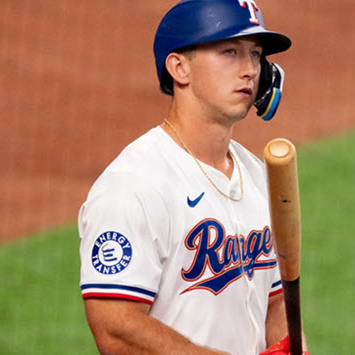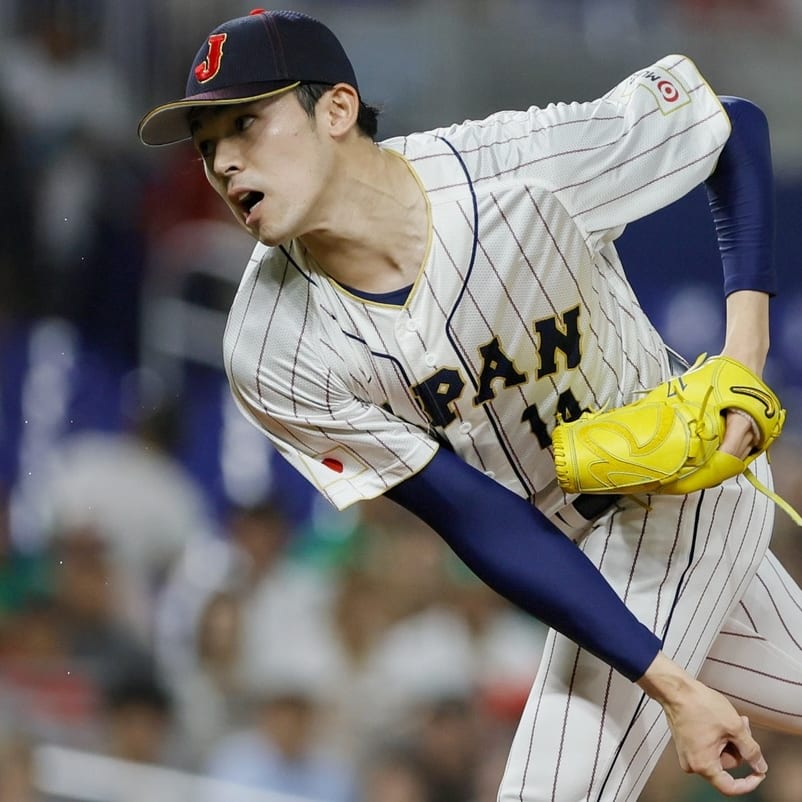This article is part of our The Z Files series.
They say admitting mistakes is the first step towards improvement, right? Well, I think it's time for me to come clean.
Austin Kearns. Brandon Phillips. Kole Calhoun. A.J. Pollock. Ketel Marte.
Over the years, I've been accused of having "my guys". You know, players I have to have on my team, no matter what.
For years, I've denied this claim, rationalizing they're just players I like more than the market for various reasons and it's only natural I end up with them. It's not that I target them, they land on my roster organically. Somehow, in my head, this meant they weren't "my guys".
Yeah, they were.
For several years, I was able to compete at a high level despite gravitating towards my guys. However, for the past two years, my fantasy game play has been subpar. Sure, when you play in as many leagues as I do, you're bound to run into a money finish or two. I'm talking about the overall quality of my showcase teams: LABR, Tout Wars and the National Fantasy Baseball Championship. I've been embarrassingly bad the past two seasons.
Perhaps this is an oversimplification, but managing a fantasy team consists of three components:
1. Preparation
2. Draft/auction
3. In-season management
Let's get this one out of the way: I need to improve my in-season management. That said, I'm not giving myself the best foundation with which to work.
I'm not saying my preparation is perfect, but I humbly believe my
They say admitting mistakes is the first step towards improvement, right? Well, I think it's time for me to come clean.
Austin Kearns. Brandon Phillips. Kole Calhoun. A.J. Pollock. Ketel Marte.
Over the years, I've been accused of having "my guys". You know, players I have to have on my team, no matter what.
For years, I've denied this claim, rationalizing they're just players I like more than the market for various reasons and it's only natural I end up with them. It's not that I target them, they land on my roster organically. Somehow, in my head, this meant they weren't "my guys".
Yeah, they were.
For several years, I was able to compete at a high level despite gravitating towards my guys. However, for the past two years, my fantasy game play has been subpar. Sure, when you play in as many leagues as I do, you're bound to run into a money finish or two. I'm talking about the overall quality of my showcase teams: LABR, Tout Wars and the National Fantasy Baseball Championship. I've been embarrassingly bad the past two seasons.
Perhaps this is an oversimplification, but managing a fantasy team consists of three components:
1. Preparation
2. Draft/auction
3. In-season management
Let's get this one out of the way: I need to improve my in-season management. That said, I'm not giving myself the best foundation with which to work.
I'm not saying my preparation is perfect, but I humbly believe my player projections, rankings and profiles can hang with anyone. The proof is others use my draft prep material with great success. They may not be using it as a standalone source, in fact I hope they aren't, but I know for a fact my preseason work is relied upon by many for use in home and high-stakes leagues.
Not to mention, my 23-year-old niece never played fantasy baseball before this year. Back in the spring, she was invited into two leagues, one a head-to-head points-based league using a serpentine draft and the other a rotisserie auction league. She asked me for help, so I gave here rankings customized to each league with a few bullet points on draft strategy. With one weekend left in the season, she's on the verge of winning the roto league while battling for the championship in the H2H one. Who cares if they're eight-team ESPN leagues, she's kicking tail with my rankings and advice. I must be doing something right!
Of course, I'm not completely serious, though I do think this speaks towards drafting being my major issue.
Looking back on my showcase teams the past two years, my problem runs deeper than focusing too much on my guys. Not only am I overpopulating my rosters with these players, I'm anticipating getting them, thus strategizing other picks around their positions and expected categorical contribution.
A perfect example from this spring was my Main Event NFBC squad. I went into the draft pretty much knowing I'd pick Manuel Margot and Bradley Zimmer, expecting at least 50 steals, maybe even 60-65. I selected Margot with the 107th pick, when his Main Even ADP was 121. I nabbed Zimmer with the 164th pick with his ADP being 180. In my mind, being aggressive relative to the market was justified as I had both ranked higher than I drafted them.
An obvious solution could be "do a better job projecting", and I should. However, I don't believe that's the end of the story. Overall, my projections are fine. The thing is, even the best projections are far from perfect. Conventional wisdom suggests most projections are about 70 percent accurate. I've never bought into that notion, but to me it doesn't matter what the number is. I'm not going to be right on all my guys, especially since they're outliers to the market. A such, I shouldn't overstock my teams with all 10 or 12 players for which I'm more bullish of the market. Sure, grab a couple, maybe even a few. Just don't overdo it.
Circling back to the idea of team construction, anticipating getting Margot and Zimmer shaped my early-round picks as I avoided drafting steals while trying to build a batting average buffer, as Zimmer in particular could have been a drain in the category. My first pick, 14th overall, was Joey Votto. At the time, I was both thrilled and experiencing buyer's remorse. Votto finished the previous two campaigns as the ninth and 11th best player, supporting my No. 10 overall 2018 ranking. So, getting him at 14 was potential source of profit. The regret came from my gut wanting Freddie Freeman, even though I had Freeman ranked in the high teens. The problem wasn't so much Votto versus Freeman, but pigeon-holing myself into wanting a high average hitter with that pick.
My second pick may be a better example. Again, looking to eschew steals since I should be covered later, I opted for Manny Machado, passing on Jose Ramirez since more of the latter's contributions emanated from his legs. Don't get me wrong, I still would have fared poorly with Freeman and Ramirez heading up my team, mainly because as bad as Margot and Zimmer were, I was even worse off with my pitchers.
Coming into the season, I was all over Luis Castillo, Robbie Ray, Zack Godley and Sonny Gray. I was also higher than most on Justin Verlander and Gerrit Cole, but since I play in NL Tout Wars, it would have been illegal to bid on someone from the Houston Astros. Ray and Castillo harpooned my Tout team, while only Godley and Gray ended up on my NFBC team, but they were my SP2 and SP3. Carlos Martinez was my SP1, then I took Craig Kimbrel, which essentially converts a typical SP3 into an SP2.
The main point being, I over-invested in these arms, and while the "do a better job projecting" argument still holds, it runs deeper than that. I went into these drafts and auction expecting to end up with these hurlers, passing on others regardless where they were ranked or fit into my team. You can absorb one or even two mistakes on a pitching staff, especially when the foundation is solid. However, when the foundation is composed of "my guys", and they disappoint, it's really hard to recover.
I know, no one cares about your team but you, and I just wrote 1000 words on something you probably don't care about. The message I want to pass along is now is the time to do a post mortem on your teams, especially if you're in a similar rut. Now is when everything is still relatively fresh, before 2019 prep begins and we're fighting over where Adalberto Mondesi should be ranked. I know, too late, we already are.
My personal lessons pertain to both the ranking and drafting of my guys. I don't mean to shrug off the projection aspect. I need to search for a common thread and adjust my process. When it comes to Margot and Zimmer, I didn't factor in they were both very young players without a track record. The projection was within their range of expectations, but I didn't factor in ample downside. To be honest, the same holds true with the pitchers. The overlapping factor to all my egregious misses was not accounting for a limited track record of success, relying too heavily on a short MLB sample.
The easy fix is to be more conservative with young player expectations while also pointing out the upside, using the pertinent underlying metrics as evidence. I'm well beyond "look at me" projections. I truthfully want to just get it right. There was a fault in my process, one which I hope is now corrected.
That said, even with more conservative rankings, I need to be more cognizant of the market, not just to help shape my own draft but to take a long look at the outliers. I pride myself on being early to the market with my projections, so much so that there isn't anything else yet available to compare. However, once other opinions are available, I need to do some cross-checking, trusting that users prefer an explanation for a changed ranking I know is off, at the risk of a backlash from those who already drafting using the initial ranking.
With respect to drafting and team construction, while reverse engineering a game plan is still necessary, I've taken it to the extreme the past few seasons, getting too cute with it. Instead of amassing as many stats early and then filling in with my guys later, I've been boxing myself into a corner even in the early rounds. If I don't get all of my guys, even if I nail their projections, my team is the better for it since it didn't sacrifice stats early on.
Again, apologies for making this about me and "my guys". Hopefully it helps you do some self-analysis, so we both see the winner's circle more often this time next year.










